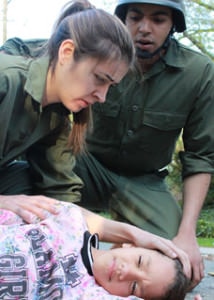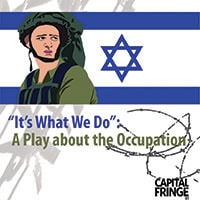At the end of my play, It’s What We Do, Ilan, an Israeli Defense Forces soldier, says:
“I’m standing guard at a post, aiming my weapon at everyone. You know what image comes to mind for a Jewish soldier pointing a gun at a bunch of citizens?” Ilan, a soldier with a philosophical bent, feels intensely the ironies of history: how could he, as a Jew, terrorize another group of people because of who they are?
This play is full of confrontations between Israeli soldiers and the Palestinians they are trying to control—encounters that distort the lives of both. The young men and women conscripted into the Israeli military at the age of 18 believe they are defending their country. Those who serve in the Occupied Palestinian Territories discover a much darker reality. Their role is to intimidate, control and pacify an entire group of people who had the misfortune of living where the Israelis want to be. If the soldiers make it bad enough, maybe the Palestinians will just leave. Disrupt their movements with more than 60 checkpoints and roadblocks; harass them with unwarranted house searches; demolish their homes on various pretexts; allow Israeli settlers to attack Arabs without restraining them. There are the policies of Occupation the Israeli government implements through the young soldiers in the IDF.

How do these soldiers respond? Some of them get high on their unwarranted power. Many are troubled by their own actions; or torn between wanting to be a good soldier and realizing the devastation they are visiting on innocent civilians. Those who are not willing to be silent about what they have done and seen may eventually give testimony to Breaking the Silence, an Israeli organization whose goal is to break the collective Israeli silence about the Occupation and its realities.
It’s What We Do is based on the book Our Harsh Logic: Israeli Soldiers’ Testimonies from the Occupied Territories, 2000-2012, compiled by Breaking the Silence. The play was born at a Busboys and Poets in the fall of 2013. Former IDF soldier Avner Gvaryahu was speaking about the book and his experience as an IDF soldier. I was inspired by his courage in speaking out about the realities of the Israeli occupation. Being a theatre person, I immediately imagined a theatrical production that might bring these soldiers’ testimonies to a wider audience.
The play is drawn directly from the testimonies in the book: all the soldiers’ reflections are verbatim; the enacted stories are ones they tell. Come listen to what they have to say—and honor the lives of the Palestinians who suffer under Occupation and the Israeli soldiers who expose it.
PERFORMANCES ARE AT:
Atlas Performing Arts Center: Lab II-
1333 H Street, NE Washington, DC 20002
Friday 7/10 at 8:15 PM
Sunday 7/12 at 4:00 PM
Wednesday 7/15 at 6:15 PM
Saturday 7/18 at 1:45 PM
Saturday 7/25 at Noon








This play–and playwright–are deliberately slanting their viewpoints and ignoring the fact that the real reason for the lack of peace in the Middle East is that a significant segment of the Palestinian people refuse to accept the right of Israel to exist. They do not want a two state solution–just one, Palestine. If the Palestinians in Gaza had tended to themselves and their needs as an independent entity after the Israelis withdrew from there in 2005 (expelling Israeli settlers in the process) instead of electing a terrorist government that prefers to shoot missiles at Israel and dig tunnels to send in suicide bombers, Israelis would have been emboldened to have allowed the West Bank to be an independent entity as well.
The article states that, “Their [Israelis] role is to intimidate, control and pacify an entire group of people who had the misfortune of living where the Israelis want to be. If the soldiers make it bad enough, maybe the Palestinians will just leave. Disrupt their movements with more than 60 checkpoints and roadblocks; harass them with unwarranted house searches; demolish their homes on various pretexts; allow Israeli settlers to attack Arabs without restraining them.” I am not defending the Israeli settlement policy–I oppose it and believe that it is the major obstacle to peace on the Israeli side. However, the majority of Israelis oppose the settlement policies, but fear terrorism from Gaza and the West Bank. The quoted statement also does not distinguish between situations where rogue soldiers and settlers commit crimes against Palestinians, for which the soldiers and settlers should be punished, from instances where there are checkpoints, roadblocks and house searches to apprehend terrorists or confiscate weapons intended for use in terrorist acts.
Finally, I see that you have a photo of Israeli soldiers and a wounded Palestinian girl. Is that intended to suggest that the soldiers wounded the girl? It looks to me that the soldiers are very concerned about the girl’s injuries and we don’t know where those injuries came from. However, given how she describes her play and the situation in the Middle East, I can only guess at the inference that Ms. Nice is trying to make to the reader.
The fact is that most Israelis want peace and a two state solution. They don’t want constant war and terrorism and fear, to say nothing of the international condemnation, whether justified from the settlement policy and illegal acts committed by settlers or rogue soldiers, or whether unjustified by people that think that Palestinians are oppressed people that are totally innocent of trying to eliminate Israel, kill civilians, fire missiles etc. If the Palestinian people could renounce and eliminate their terrorist component, accept the existence of Israel and make peace with Israel, as Egypt did more than 30 years ago, there would be a Palestinian state (apart from Jordan of course) and peace in the region. I note that in the three plus decades since Israel made peace with Egypt and gave up the oil rich Sinai, there has been no Israeli military activity in the Sinai or in Egypt.
The bottom line here is that there will not be true peace until both sides can talk to each other without completely demonizing the other and claiming that only one side is without blame as setting obstacles for peace.
I had the good fortune to see the opening night performance of Ms. Nice’s play last evening. I was struck by the power and immediacy of the performances. There’s something about seeing these stories unfold directly in front of you that the screen cannot match. It is a shame the commenter above felt the need to bring his own tired ideological preoccupations to bear on a play composed of stories taken verbatim from IDF soldiers. Regardless of one’s political views on the conflict the testimonies in this play have clear truth and relevance to the situation. Read books for political analysis. See this play for compelling human experiences.
The play presents all to well the Kafkaesque world that permeates the lives of both soldiers & citizens living in the Occupied West Bank.. the perpetration of cruelty manufactured to disrupt . control is shameful.
“It’s What We Do” brings to life with great immediacy what it means to live under occupation in Palestine, including the daily humiliations of being held up at check points, the frustration when confronting arbitrary and brute force, the physical threat from gun-toting soldiers and stone-throwing settlers, the violence of night raids on peoples’ homes, the loss of land and olive trees that are the source of livelihood of the farmers and their families, and the actual demolition of peoples’ private homes. But the play goes much further and highlights the impact of the occupation on the IDF soldiers themselves. As much as they try to ignore the effects of what they have been asked to do, they cannot repress the memories forever and as they struggle to come to terms with “What [They] Do,” there is a glimmer of hope that at least some of them will recognize the humanity of their victims. For anyone interested in Israel/Palestine issues, this play is a must see!